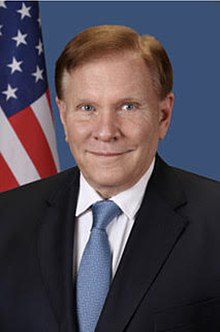William Flynn Martin | |
|---|---|
 | |
| Special Assistant to the President for National Security Affairs | |
| In office 1983–1985 | |
| President | Ronald Reagan |
| Executive Secretary of the United States National Security Council | |
| In office 1985–1986 | |
| President | Ronald Reagan |
| United States Deputy Secretary of Energy | |
| In office 1986–1988 | |
| President | Ronald Reagan |
| Preceded by | Danny Julian Boggs |
| Succeeded by | Joseph F. Salgado |
| Executive Director Republican Platform Committee | |
| In office 1992–1993 | |
| President | George H.W. Bush |
| Chairman of the United States Nuclear Energy Advisory Committee | |
| In office 2002–2012 | |
| President | George W. Bush |
| President of the Council of the United Nations University for Peace | |
| In office 2003–2008 | |
| Secretary-General |
|
| Personal details | |
| Born | October 4, 1950 Tulsa, Oklahoma, U.S. |
| Political party | Republican |
| Alma mater | University of Pennsylvania (BS) Massachusetts Institute of Technology (MS) |
William Flynn Martin (born October 4, 1950) is an American energy economist, educator, and international diplomat. Martin served as Special Assistant to Ronald Reagan for National Security Affairs, Executive Secretary of the United States National Security Council, and United States Deputy Secretary of Energy during the Ronald Reagan Administration. He was President of the Council of the University for Peace, appointed to the Council by Secretary General of the United Nations Kofi Annan. In 1992, he was Executive Director of the Republican Platform committee under George H. W. Bush. William Martin served for ten years (from 2000 to 2010) as Chairman of the Nuclear Energy Advisory Committee during the administrations of George W. Bush and Barack Obama.
Martin was born in Tulsa, Oklahoma. He achieved his Bachelor of Science from the Wharton School of the University of Pennsylvania in 1972 and his Master of Science from MIT in 1974. His master's thesis was the basis of an article he co-authored with George Cabot Lodge in the March, 1975 Harvard Business Review entitled Our Society in 1985: Business May Not Like It.[1]
William Martin is the recipient of seven letters of merit from Ronald Reagan, received the Order of the Rising Sun in person from Emperor Akihito of Japan, and was commended by Czech President Vaclav Havel for significant contributions to the Czech Republic.In 2023 he received the Distinguished Contribution to Diplomacy Medal of the Czech Republic. Martin received the highest honor of the Department of Energy for contributions in the fields of energy security and science and technology including fathering both the human genome project (1986) and international thermonuclear experimental reactor - ITER (1985). Secretary of Energy Dan Brouillette honored Martin’s contributions thirty five year service to the Department of Energy in 2019.[2]
Martin’s perspectives on President Reagan are summarized in a book Reflections on President Reagan and an oral history video. His lifelong experiences with Japan are included in US-Japan Relations and Energy Security (1970-2100).[3][4][5] William F. Martin’s publications have appeared in the Harvard Business Review, Harvard International Review, MIT Technology Review, and the Wall Street Journal. He has authored several books on energy, environment, and national security through MIT Press (two books), McGraw-Hill, Trilateral Commission, United States Department of Energy, and the International Energy Agency. His books have been published in Japanese, German, and French.[6]
William F. Martin’s official White House government National Security Council files are available in the Ronald Reagan Library archive
- ^ "Articles - Google Drive". Drive.google.com. Retrieved 19 February 2022.
- ^ "Presidential Letters and Awards - Google Drive". Drive.google.com. Retrieved 19 February 2022.
- ^ "Books - Google Drive". Drive.google.com. Retrieved 19 February 2022.
- ^ "William Martin Video History (Reagan) - Google Drive". Drive.google.com. Retrieved 19 February 2022.
- ^ "Japan and the Santa Fe Seminar - Google Drive". Drive.google.com. Retrieved 19 February 2022.
- ^ "William F. Martin Publications - Google Drive". Drive.google.com. Retrieved 19 February 2022.